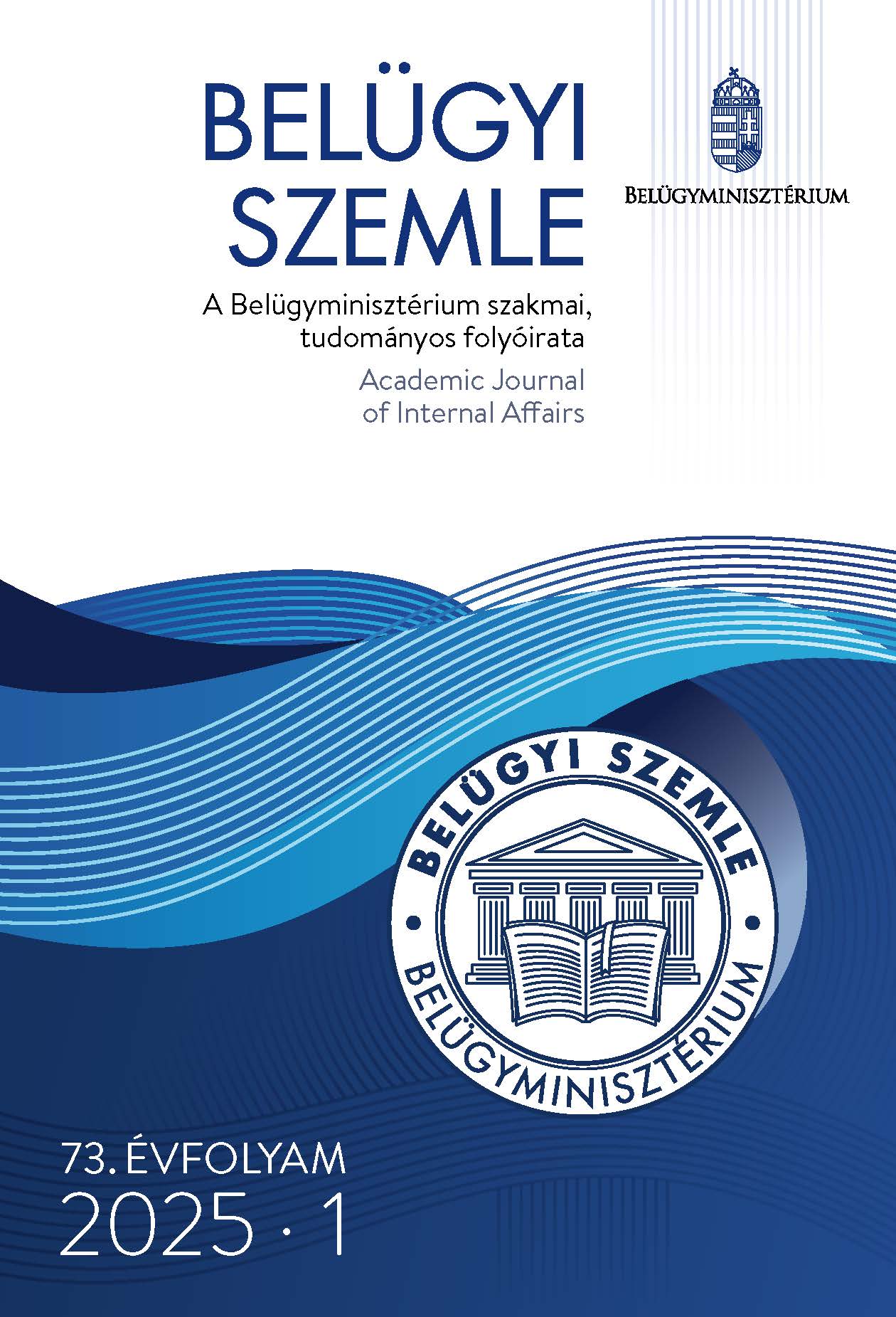Absztrakt
Aim: Motivation is an important management tool, especially in organisations where people's skills and abilities are crucial to effective performance. An example of such an organisation is the Police, which is still people-centred despite information technology modernisation. Motivation is therefore essential not only in leadership, but also in the psychological selection process, and its components and characteristics are examined.
Methodology: For each member of the law enforcement services is a must, based on the legal obligation, to have the proper health, psychic and physical condition. The psychological test can facilitate police recruit selection, which includes, among others, an Occupational Stress Questionnaire for Law Enforcement Services (OSQLES), which has been used for decades in Hungary.
Findings: In according to Herzberg's two-factor theory, I review and analyse the OSQLES' relevance and suitability for law enforcement services.
Value: I will answer two questions. Firstly, whether the OSQLES is a suitable method to obtain the right information through questions and scales and secondly, whether it is suitable to identify the factors of the Herzberg's theory.
Hivatkozások
Benke, M. (2018). A motiváció és tanulás kapcsolatának vizsgálata: fókuszban az önmeghatározás elmélet [Examining the relationship between motivation and learning: Focus on self-determination theory]. Pécsi Tudományegyetem.
Borbély, Zs. (2019). Egészségmagatartás és mentális egészség – nemi különbségek a munkahelyi stressz megélésében [Health behaviour and mental health – Gender differences in experiencing workplace stress]. Belügyi Szemle, 67(7–8), 37–50. https://doi.org/10.38146/BSZ.2019.7-8.3
Borbély, Zs. (2020a). Health behaviour, stress, and police trainees. Hungarian Defence Review, 148(2), 112–131. https://doi.org/10.35926/HDR.2020.2.8
Borbély, Zs. (2020b). Specifikus stresszorok és a szervezeti kultúra [Specific stressors and organizational culture]. In Farkas, J. & Horváth, J. (Szerk.), Szervezeti kultúrák és kutatásuk [Organizational cultures and their research] (pp. 116–138). Nemzeti Közszolgálati Egyetem.
Borbély, Zs. (2021a). A járványügyi veszélyhelyzet megélése a próbaidős tiszthelyettesek körében [Experiencing the epidemic emergency among probationary police officers]. Magyar Rendészet, 21(2), 111–125. https://doi.org/10.32577/mr.2021.2.7
Borbély, Zs. (2021b). Specifikus stresszorok a rendvédelmi szervezeti kultúrában [Specific stressors in law enforcement organizational culture]. Honvédségi Szemle, 149(3), 92–107. https://doi.org/10.35926/HSZ.2021.3.8
Farkas, F., Jarjabka, Á., Lóránd, B. & Bálint, B. (2013). Munkahelyi motivációk Magyarországon 2013-ban [Workplace motivations in Hungary in 2013]. Vezetéstudomány, 44(10), 12–23. https://doi.org/10.14267/VEZTUD.2013.10.02
Farkas, J. & Sallai, J. (2021). 21st century challenges and solutions in the light of history. Security Horizons, 2(4), 273–279. https://doi.org/10.20544/ICP.2.4.21.P24
Farkas, J. & Horváth, J. (2020). Szervezeti kultúrák és kutatásuk [Organizational cultures and their research]. Nemzeti Közszolgálati Egyetem.
Fridrich, A. C. (2015). Az eltérő szakterületeken dolgozó rendőrök teszteredményeinek vizsgálata – Hasonlóságok és különbségek az RMSK tükrében [Examining test results of police officers working in different professional fields – Similarities and differences in light of the RMSK]. ELTE-PPK.
Gősiné Greguss, A. & Bányai, É. (2006). A motiváció [Motivation]. In Oláh, A. (Szerk.), Pszichológiai alapismeretek [Fundamentals of psychology] (pp. 321–369). Bölcsész Konzorcium.
Herzberg, F. R. (1968). One more time: How do you motivate employees? Harvard Business Review, 46(1), 53–62.
Maslow, A. H. (1943). A theory of human motivation. Psychological Review, 50(4), 370–396. https://doi.org/10.1037/h0054346
Szabó, E. (2009). A munkahelyi egészségpszichológia és egészségfejlesztés rendszere a Magyar Köztársaság Rendőrségén, valamint a szubjektíve észlelt munkahelyi stresszterheltség jellegzetességei – különös tekintettel az idői tényezőre – a hivatásos állományú rendőrök körében [The system of occupational health psychology and health promotion in the Hungarian Police, and the characteristics of subjectively perceived occupational stress—With special attention to time factors—Among professional police officers] [Doctoral dissertation, Faculty of Humanities, University of Debrecen]. University of Debrecen. https://dea.lib.unideb.hu/items/9d8d194d-b389-40c5-bbe3-38b9e81a2156
Tegyey, A. C. (2018). Eltérő szakterületek a szervezeti kultúrában [Different professional fields in organizational culture]. In Farkas, J. & Horváth, J. (Szerk.), Szervezeti kultúrák és kutatásuk [Organizational cultures and their research] (pp. 139–156). Nemzeti Közszolgálati Egyetem.
West, M. (2022). Maslow’s hierarchy of needs: Uses and criticisms. Medical News Today. https://www.medicalnewstoday.com/articles/maslows-hierarchy-of-needs

This work is licensed under a Creative Commons Attribution-NonCommercial-NoDerivatives 4.0 International License.
Copyright (c) 2025 Belügyi Szemle
